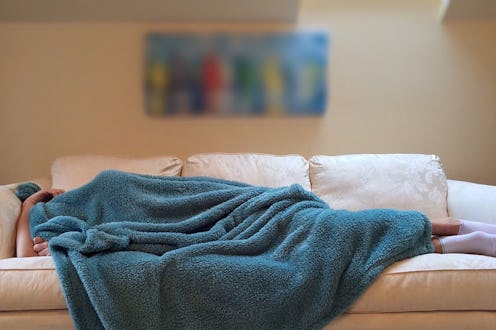Life
How Your Sleeping Position Affects Your Wellbeing

It's not just a matter of getting enough sleep, but also how you get your sleep that can affect your health and wellbeing. Understanding how your sleep position can affect you and can reflect how you spend your days will help you improve your productivity, mood, and energy levels, as explained by experts at WebMD. By being so in tune with your bodily and mental responses, you'll be happier and in control. Getting those 7 to 9 hours nightly is awesome, but knowing how to reap maximum benefits based on position is even cooler.
As a certified health coach, I work with clients on getting adequate sleep to feel restored and refreshed each morning. When my clients feel sleepy and low in energy, it can affect how well they work in the office and how much they can cross of their task lists. By sleeping in a position that gives you the best chance at feeling mentally and physically alert and better balanced, you'll achieve greater success in the day and feel more accomplished. Here are 9 ways that your sleeping position can determine how healthy you are, and why it's good to know your body better.
1. Lower Back Pain
Over email with Bustle, Brandon Berman, Sleep Research Expert at Reverie, explains that "stomach sleeping just might be one of the worst sleeping positions, as it has shown to flatten your spine’s natural curve and lead to lower back pain." This can come from sleeping on your stomach, Berman explains.
2. Neck Pain
Also with sleeping on your stomach, you might experience pain in your neck, and this can become chronic and dangerous if left untreated, explains Berman. "Stomach sleeping requires your neck to be twisted to the right or left, which can lead to serious damage or discomfort in the cervical joints of the neck," Berman says.
3. Shoulder Pain
Often from sleeping on your side, shoulder pain can result if you're hanging too long on one side and not switching to new positions throughout the night, explains Berman. "Resting all of your weight onto one side can lead to shoulder pain and for some, lower back pain. This can be remedied by slipping a pillow in between the knees," Berman says.
4. Better Circulation
Here's a benefit for sleeping on your side: Berman explains that side sleepers are more likely to have healthier hearts from being in such a position during the night. "The vast majority of people prefer to sleep on their side, which has shown to improve circulation to the heart," Berman explains.
5. Wrinkles
If you're a back sleeper, then you might have clearer, more youthful, and less wrinkly skin, explains Berman (which we all want, right?). "There’s evidence that sleeping on your back results in fewer facial wrinkles, as the eyes and cheeks aren’t mashed against a pillow for a third of their lives," Berman says. Stomach sleepers, look out.
6. Spinal Alignment
While back pain can occur for people who sleep on their stomaches and even sides, sleeping on the back can reduce spinal issues and promote proper alignment for the back and neck, advises Berman. "Back sleeping is arguably the best position for the spine, since the back and neck remain in a more neutral alignment," Berman says.
7. Overall Wellbeing
"Sleeping on your side is typically best for overall health and well being. It takes pressure off the hips and lower back better than any other position," says Dan Adler, Founder & CEO, WinkBeds, over email with Bustle. "One infrequently used trick is to sleep without a pillow. Doing so naturally gets people off of their stomach, a position that can stress the lower back, and onto their side or back, which are more sleeping supportive positions," Adler says.
8. Brain Health
According to a study from Stony Book University examining sleep position, side sleeping is the best for brain health, as it lowers risk of Alzheimer's disease and dementia. Having great brain health is so important as you age, so try switching to your side for a healthier mind longterm.
9. Breathing Problems
According to Dr. Carol Ash, director of sleep medicine at Meridian Health New Jersey over interview with Today, sleeping on your stomach can impair breathing and respiratory issues, while sleeping on the back can help make breathing easier. This is especially prevalent in those with sleep apnea, Ash explained.
If you experience any of these issues, consider your sleeping position and see if switching to a different style might mitigate the symptoms. Often times it takes some experimentation to see what works for you, but once you find the position that gives you the best sleep, physical health, and mental health, it'll all be worth it.
Images: Pixabay (8); Pexels (2)